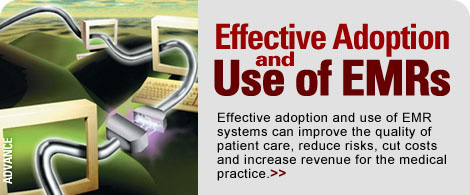advance for Heath Information Professionals - Nov 2004
Effective Adoption and Use of EMRs 
By Divan Da've The health care industry has undergone tremendous change in the past few years. One of these is the evolution of electronic medical records (EMR)—a concept that has the potential to transform the health care industry. As practice management systems changed the way physicians handled the billing, EMRs systemize the creation and presentation of clinical information, which is readily accessible to physicians and practice staff.
In its simplest form, the concept of EMRs is basically electronic storage and instant availability of clinical information to authorized users at the point of care. Increased efficiency is one of the foremost benefits.
Studies by the Institute of Medicine (IOM) report that more than 7,000 deaths and up to 7 percent of hospital admissions are caused each year by adverse drug effects. Information technology in health care could substantially reduce these errors.
Given the benefits, which accrue from EMR systems, one would conclude that most medical practices would be keen to move forward with their usage. Surprisingly, the health care industry is not moving fast to EMR implementation and usage. According to a recent article in USA Today, fewer than 10 percent of health care physicians rely on computerized record keeping. Some of the reasons to low adoption of EMR in medical practices are physicians’ skepticism about the value of technology, staff’s resistance to change and the hurdles of transitioning paper to electronic charts. In addition to these, most of the systems on the market have been slow, difficult to use, inflexible and expensive.
To overcome these obstacles, a new breed of EMR software has been designed that is adaptable, user-friendly and easy to customize. EMRs have evolved from their early days of verbose text entry to voice capturing, document imaging, point and click template driven charting systems with ease of usability and features customizable to the specialty-specific health care facility. "If" physicians will use EMR software is no longer the question - it is "when" that needs to be decided. EMRs have finally arrived. Uncertainty or the fear of making the wrong choice remains among one of the prime barriers. Selecting the right EMR for your practice is a serious decision; a little digging will uncover the recommendations for you to buy the right EMR.
Yes, doctors do need to invest financial resources in EMR systems. The increased efficiency more than covers up for the investment. It also makes sense in looking at the cost of not using EMR technology. The opportunity cost includes the cost of inadvertent medication errors, under-coding, rejections of claims and high turnaround time for reimbursement. The costs saved include reduced expenses for chart storage, copying, transcription and labor. Contrary to the assumption that because of heavy investment costs only large clinics can invest in EMR systems, there is a range of reasonably priced options specifically for the small to mid-sized clinics.
Most branded EMR software targeted at large and established practices come with a big price tag. While these practices may have the resources to invest in such systems, small to medium size practices should opt for affordable, ASP-based EMR software that is gaining acceptance rapidly. It requires virtually no upfront investment. Other benefits of ASP-based EMR are the reduction of costs associated with software and hardware upgrades, no data storage and backup qualms, and no need to contract or hire technical support personnel for system maintenance.
Implementation of an EMR system for a practice can be eased with the help of “tech-savvy” physicians and practice staff, which will not face the hurdle of transitioning paper to electronic records. By sparing some time to understand the system initially, they can reap its benefits in the long run. Practices should prefer a modular system that grows with the practice needs and electronic readiness over a period of time.
Physicians can opt for a Web-based EMR that can be accessed remotely from home or other locations. In a Web-based EMR, the medical records stored in a secure environment are accessible via the Internet-connected PCs. It also allows multiple user access across locations.
It is advisable for practices to buy an EMR, which can be integrated with their practice management system to avoid future problems of maintaining disparate information systems. Patient information, such as demographics, insurance coverage and clinical information can be populated in a clinic’s practice management system from an EMR. Integrated systems reduce data entry redundancies and provide the practice with a single point interface to access clinical data.
Effective adoption and use of EMR systems can improve the quality of patient care, reduce risks, cut costs and increase revenue for the medical practice. In short, a properly implemented EMR system can save significant amount of time and money for the physicians.
Divan Da’ve is the CEO and founder of OmniMD™, a developer of HIPAA compliant Internet-based enterprise clinical solutions, located in Tarrytown, NY. He can be reached ddave@ismnet.com. |